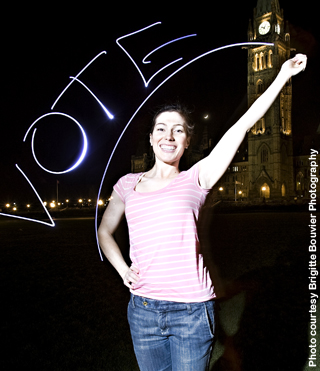 Hi, my name is Nicole Goodman. I am a PhD candidate at Carleton University in Ottawa. My scholarly interests include Canadian political institutions, especially electoral institutions, turnout, survey methodology, citizenship and civic duty, and the effect of the Internet on elections and political participation. My current work is focused on voting turnout, particularly among young people, and Internet voting. I am very excited to be working with Delvinia on a project examining the effects of online ballots in the Town of Markham by surveying electors and candidates.
Hi, my name is Nicole Goodman. I am a PhD candidate at Carleton University in Ottawa. My scholarly interests include Canadian political institutions, especially electoral institutions, turnout, survey methodology, citizenship and civic duty, and the effect of the Internet on elections and political participation. My current work is focused on voting turnout, particularly among young people, and Internet voting. I am very excited to be working with Delvinia on a project examining the effects of online ballots in the Town of Markham by surveying electors and candidates.
To give you some background information, Markham was the first major Canadian municipality to introduce Internet voting as an alternative voting method; and this will be the third consecutive election in which it is offered. Many people don’t know this, but Canada is quickly emerging as a leader in Internet voting. On October 25, 2010 (municipal election day in Ontario) for example, 44 municipalities across the province will be offering Internet voting, This means that an estimated 800,000 eligible electors will have the option of casting their ballot online at some point during the election period. Given the amount of binding elections using Internet voting, and the interest that is being generated at provincial and federal levels of government, it is important to start collecting data from the public and other election stakeholders and studying the effects of Internet voting on elections in Canada.
Delvinia was the first to start a research programme examining Internet voting in 2003 when Adam and his team conducted an exit poll of Internet voters. They then repeated a similar survey and issued report of the findings from the 2006 election. My role in the 2010 version of this project is to help Delvinia refine its public opinion surveys and analyze the findings by generating a report. I also hope to produce some academic papers examining the impact of Internet voting in Canadian municipal elections to create awareness on this very important topic. There is a significant research gap as far as the effects of Internet voting are concerned and I am proud to be working with Delvinia and contributing toward creating a research programme and collecting attitudinal data over time. This information is important for governments and policy makers, elections management bodies, relevant community and professional organizations, citizens, and academics both within Canada and abroad.
I would like to thank Adam Froman and the Town of Markham for recognizing the importance of this research and giving me the opportunity to make a contribution to this study.